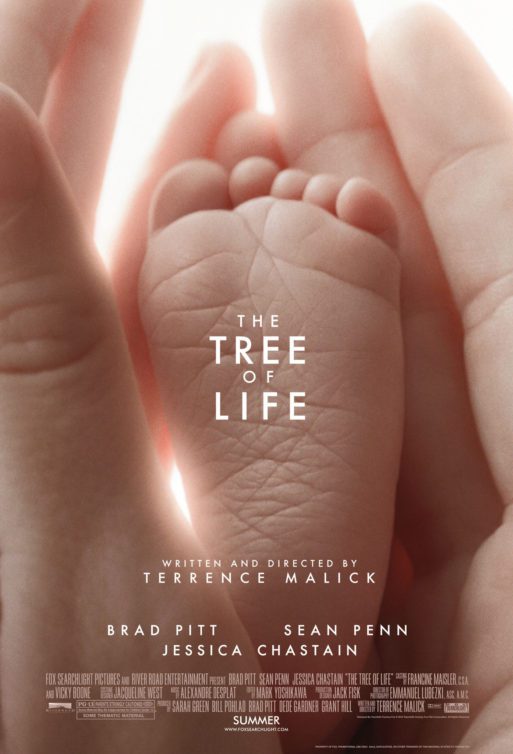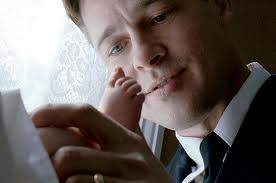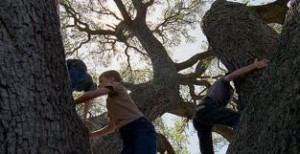 The Tree of Life, Terrence Malick’s fifth feature film, is as polarizing as it is experimental. The reclusive Malick has a reputation for creating a film entirely faithful to his original vision, sometimes to the chagrin of his producers who are trying to sell said film to your average moviegoing audience. This year, The Tree of Life was nominated for the Academy Award for Best Picture, and it earned the 2011 Palme d’Or at the Cannes Film Festival, where it was reportedly met with a mixture of applause and boos.
The Tree of Life, Terrence Malick’s fifth feature film, is as polarizing as it is experimental. The reclusive Malick has a reputation for creating a film entirely faithful to his original vision, sometimes to the chagrin of his producers who are trying to sell said film to your average moviegoing audience. This year, The Tree of Life was nominated for the Academy Award for Best Picture, and it earned the 2011 Palme d’Or at the Cannes Film Festival, where it was reportedly met with a mixture of applause and boos.
Though some may find its presentation meandering or indulgent, there is no denying the beauty of this film. We meet Mr. and Mrs. O’Brien—or, to main character Jack, Father and Mother—just after they’ve received news that their middle son, Jack’s brother R.L., has died at 19. The rest of the film is a mixture of highly impressionistic memories of Jack’s childhood and grandiose images of life, including a 20-minute montage of life’s beginnings from the cosmos to the primordial ooze to the human fetus (this is probably the film’s most polarizing sequence; I have to admit I was taken a little aback when CGI dinosaurs appeared on the screen).
The story of life is thus played out on both a small and large scale. Most of the story takes place in what seems to be a single year, when Jack is 12 or 13 and growing up in Waco, Texas with Father, Mother, R.L. and youngest brother Steve. Father (Brad Pitt) is “nature”: a frustrated musician, working in a dead-end job, disillusioned with the world, rough and unfathomable to his boys. Mother (Jessica Chastain) is “grace”: free-spirited, gentle, loving to a fault, but unable to protect her boys from their father’s anger, or even, when it comes, from death. The memories of this period are taking place inside grown-up Jack (Sean Penn); he seems to struggle to understand his parents’ very different loves, as well as the loss of his brother. Much of the emotional journey is his effort to understand his brother’s death, both for himself and for his grieving parents.
Malick undoubtedly has an eye for moving imagery. So much of the film is visual, sometimes to the point of invoking other senses; very little is devoted to straightforward dialogue. Jack and Mother offer whispered voiceovers that sound like conversations with God: “Where were you?” Mother asks—a plea to understand how a boy’s death can fit into a benevolent Creator’s plan. “What are we to you?”
While 12-year-old Jack finds himself emulating his father’s roughness, his brother R.L. is sensitive like his mother. Jack learns, and in remembering seems to relearn, his brother’s grace. In a final sequence, grown Jack walks through a twilit landscape and meets his family as they were when they were young. He picks up young R.L. and gives him to his mother and father; and in turn his mother lets him go. “I give him to you,” her voiceover whispers, again, to a Maker. “I give you my son.” We understand that in some way, Jack has found peace, even though so many years have passed.
It remains true that this film won’t be for everyone. Malick’s ambition and his unique approach to filmmaking will alienate those who appreciate a more straightforward story, or who avoid experimental art house and its conceits. It may be that some of Malick’s risks are misses: I could have done without that 20-minute montage, and some of the whispered lines of dialogue feel forced or simplistic. But what Malick has done is take on nothing less than Life and all its attendant themes, including death, loss, family, spirituality, and love. The story of this family, so universally dysfunctional, is truly captivating. It’s impossible not to be moved by the incredibly intimate experience of living Jack’s memories and his complicated love for his family. Whatever adjectives you use to describe this film – good or bad – “beautiful” has to be one of them.

 The Tree of Life (2011) by Terrence Malick
The Tree of Life (2011) by Terrence Malick





 First the Wealth Gap, Now the U.S. Has a Growing Health Gap
First the Wealth Gap, Now the U.S. Has a Growing Health Gap
 How to Comfort A Dying Loved One
How to Comfort A Dying Loved One
 Our Annual Seven Holiday Gifts for Someone Who Is Grieving, 2024 Edition
Our Annual Seven Holiday Gifts for Someone Who Is Grieving, 2024 Edition














